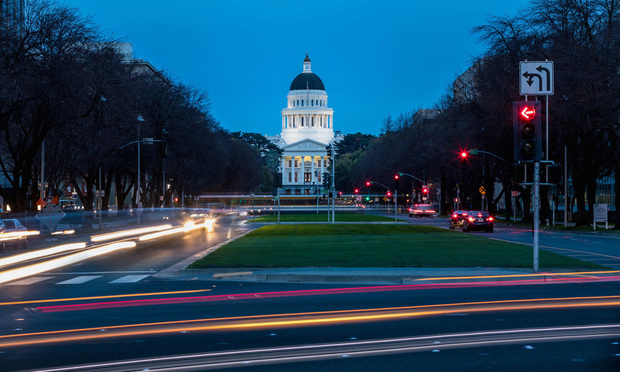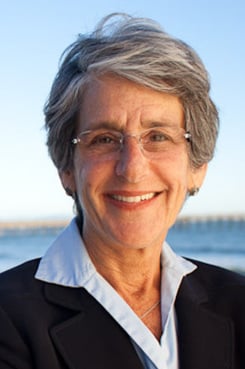California Bar, Seeking $100 Dues Increase, Warns of Service Cuts
The fee hike and add-ons would raise an active lawyer's 2020 bill to $860. The Legislature has not approved an increase in fees, previously called dues, since 1998.
March 18, 2019 at 06:38 PM
3 minute read
 Sacramento State Capitol building on Capitol Way. (Photo: Jason Doiy / ALM)
Sacramento State Capitol building on Capitol Way. (Photo: Jason Doiy / ALM)
California's state bar will ask lawmakers to hike fees for active lawyers by at least $100 annually to offset a projected operating deficit that bar leaders say will top $32 million by next year.
Bar trustees also want to charge lawyers $330 in one-time fees to pay for technology and building improvements as well as boosts in reserves and a fund that helps clients harmed by lawyers' dishonesty or theft.
The fee hike and add-ons would raise an active lawyer's 2020 bill to $860. The Legislature has not approved an increase in fees, previously called dues, since 1998.
“No amount of re-engineering and budget-cutting can make up for the fact that [the bar's] core source of revenue is flat, while costs for labor, technology, and other necessities keep rising,” Board of Trustees President Jason Lee said in a statement issued Friday after trustees endorsed the request. “We cannot manage our way out of this crisis, and we're hopeful that the State Bar's ability to fulfill its public protection mission won't be put in jeopardy.”
Bar leaders are also seeking an inflation trigger in the 2020 fees bill that would automatically increase rates in future years.
 Sen. Hannah-Beth Jackson
Sen. Hannah-Beth JacksonFor years, trustees have sought fee increases to pay for growing labor costs and to bolster the bar's troubled disciplinary unit. In recent years, however, the Legislature has declined those requests as it pushed the agency to re-emphasize its regulatory mission, cut costs and sever ties with the professional sections and any advocacy work. Bar officials say if they don't receive more funding this year they will have to make cuts in staff and services.
Sen. Hannah-Beth Jackson, D-Santa Barbara, who chairs the Senate Judiciary Committee and will carry the fee bill this year, said lawmakers are waiting to see bar audit reports due in spring and summer from the state auditor and the legislative analyst's office.
“I'm not particularly surprised by the ask for an increase,” Jackson said Monday. “The reception for that ask will really be considered when we get those reports.”
Jackson acknowledged the 20-year span since the last fee increase. As for the one-time charges of $330, “the bar is really going to have to demonstrate a very strong case, certainly for anything that resembles that large amount.”
Trustees and bar staff members are still working on a “scaling” mechanism that would lower fees for lower-earning lawyers. The bar's executive director, Leah Wilson, noted at a trustees' meeting last week that any discounted rates would have to be offset by higher fees for lawyers with higher salaries or higher household incomes.
Read more:
Key Lawmaker Urges State Bar to Re-Evaluate Bar Exam
'Frightening' Bar Exam Results, but No Plans to Lower Passing Score
State Bar Leaders Eye Big Dues Increase to Salvage Budget
No Bar Dues Hike Expected, but Here Are Some Changes You'd See
This content has been archived. It is available through our partners, LexisNexis® and Bloomberg Law.
To view this content, please continue to their sites.
Not a Lexis Subscriber?
Subscribe Now
Not a Bloomberg Law Subscriber?
Subscribe Now
NOT FOR REPRINT
© 2025 ALM Global, LLC, All Rights Reserved. Request academic re-use from www.copyright.com. All other uses, submit a request to [email protected]. For more information visit Asset & Logo Licensing.
You Might Like
View All
Invoking Trump, AG Bonta Reminds Lawyers of Duties to Noncitizens in Plea Dealing
4 minute read

California's Chief Justice Starts Third Year With Questions About Fires, Trump and AI
4 minute read
Willkie Farr & Gallagher Drives Legal Challenge for Uber Against State's Rideshare Laws
5 minute readTrending Stories
- 1Reviewing Judge Merchan's Unconditional Discharge
- 2With New Civil Jury Selection Rule, Litigants Should Carefully Weigh Waiver Risks
- 3Young Lawyers Become Old(er) Lawyers
- 4Caught In the In Between: A Legal Roadmap for the Sandwich Generation
- 5Top 10 Developments, Lessons, and Reminders of 2024
Who Got The Work
J. Brugh Lower of Gibbons has entered an appearance for industrial equipment supplier Devco Corporation in a pending trademark infringement lawsuit. The suit, accusing the defendant of selling knock-off Graco products, was filed Dec. 18 in New Jersey District Court by Rivkin Radler on behalf of Graco Inc. and Graco Minnesota. The case, assigned to U.S. District Judge Zahid N. Quraishi, is 3:24-cv-11294, Graco Inc. et al v. Devco Corporation.
Who Got The Work
Rebecca Maller-Stein and Kent A. Yalowitz of Arnold & Porter Kaye Scholer have entered their appearances for Hanaco Venture Capital and its executives, Lior Prosor and David Frankel, in a pending securities lawsuit. The action, filed on Dec. 24 in New York Southern District Court by Zell, Aron & Co. on behalf of Goldeneye Advisors, accuses the defendants of negligently and fraudulently managing the plaintiff's $1 million investment. The case, assigned to U.S. District Judge Vernon S. Broderick, is 1:24-cv-09918, Goldeneye Advisors, LLC v. Hanaco Venture Capital, Ltd. et al.
Who Got The Work
Attorneys from A&O Shearman has stepped in as defense counsel for Toronto-Dominion Bank and other defendants in a pending securities class action. The suit, filed Dec. 11 in New York Southern District Court by Bleichmar Fonti & Auld, accuses the defendants of concealing the bank's 'pervasive' deficiencies in regards to its compliance with the Bank Secrecy Act and the quality of its anti-money laundering controls. The case, assigned to U.S. District Judge Arun Subramanian, is 1:24-cv-09445, Gonzalez v. The Toronto-Dominion Bank et al.
Who Got The Work
Crown Castle International, a Pennsylvania company providing shared communications infrastructure, has turned to Luke D. Wolf of Gordon Rees Scully Mansukhani to fend off a pending breach-of-contract lawsuit. The court action, filed Nov. 25 in Michigan Eastern District Court by Hooper Hathaway PC on behalf of The Town Residences LLC, accuses Crown Castle of failing to transfer approximately $30,000 in utility payments from T-Mobile in breach of a roof-top lease and assignment agreement. The case, assigned to U.S. District Judge Susan K. Declercq, is 2:24-cv-13131, The Town Residences LLC v. T-Mobile US, Inc. et al.
Who Got The Work
Wilfred P. Coronato and Daniel M. Schwartz of McCarter & English have stepped in as defense counsel to Electrolux Home Products Inc. in a pending product liability lawsuit. The court action, filed Nov. 26 in New York Eastern District Court by Poulos Lopiccolo PC and Nagel Rice LLP on behalf of David Stern, alleges that the defendant's refrigerators’ drawers and shelving repeatedly break and fall apart within months after purchase. The case, assigned to U.S. District Judge Joan M. Azrack, is 2:24-cv-08204, Stern v. Electrolux Home Products, Inc.
Featured Firms
Law Offices of Gary Martin Hays & Associates, P.C.
(470) 294-1674
Law Offices of Mark E. Salomone
(857) 444-6468
Smith & Hassler
(713) 739-1250






